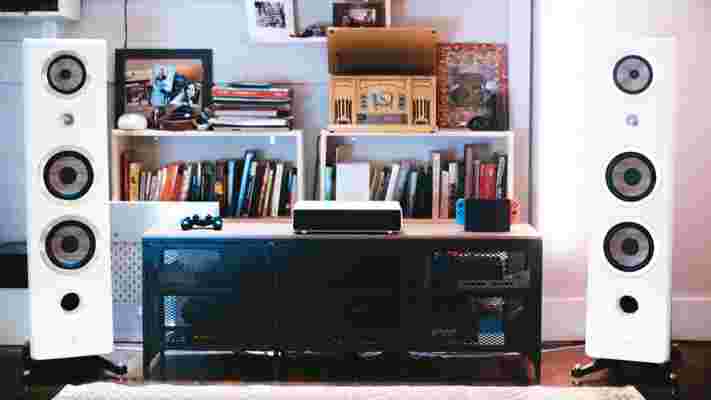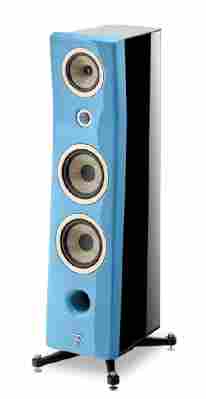Focal Kanta No. 3 Review: These $13,000 speakers are stunning pieces of audio furniture
When French speaker manufacturer Focal offered to let me review its flagship product, the $230,000, 700-pound Utopias, I despaired a little. Despite my curiosity to audition speakers that cost more than an Ivy League’s four-year tuition, I didn’t know where I’d begin to review something that expensive. I also didn’t know how I’d get them into my apartment.

Instead, I settled for one of the company’s (relatively) more accessible speakers, the Kanta No. 3. Stunning for its modern design as well as sound quality, the Kanta No 3 is the type of speaker you buy as a long-term investment for your home – a piece of audio furniture.
Of course, $12,000 is only ”more accessible” in relation to its vastly more expensive sibling, but at least it’s less than a decade of rent.
This is a price tier of audio gear I’ve consciously avoided so far. I believe comparisons are crucial to audio reviews, and ideally, you’d only compare speakers you’ve heard recently in your own listening room. That’s hard to do with giant, crazy-expensive speakers, and I’ve not done so with anything near the Kanta’s price point.
With those disclaimers clear, I deeply enjoyed my time with the Kanta. They are hardly what I’d call the best bang for your buck, but they are the kind of product where – if you’ve got the dough – function and form come together in a way that’s greater than the sum of its parts.
The Kanta’s design is arresting. Aesthetic preferences are subjective, but to this subject, the Kanta’s two-tone design makes it one of the best looking speakers I’ve seen – real-life or otherwise. Some audiophiles think all decisions should be based on sound quality, but others and I contend that aesthetics have a meaningful impact on your enjoyment of music. No matter the speaker, you’ll always spend more time looking at it than listening to it.


It helps that Kanta No. 3 is available in various colors and finishes, allowing you to match it to your particular space. It is the rare floor-standing speaker that makes a room look better for its presence – nearly as much a sculpture as a gadget. That said, if a 50″ tall speaker is too much for you, you could opt for the smaller (and cheaper) Kanta No. 2 or No. 1.
The speakers come with a set of adjustable spikes that allow you to angle the drivers toward your ears. This is an important step for ensuring the best sound, and the Kanta sounded best pointed directly at my noggin.
Thankfully, they don’t need a crazy amount of power to get going either. Some of you will scoff at the fact I did most of my testing out of a $600 Yamaha RX-V685 receiver, but the receiver has tackled everything else with aplomb and I did not find the Kanta – which are relatively sensitive speakers – to be lacking power. They did sound better when connected to a pair of Emotiva PA-1 monoblocks I received towards the end of my test period, but not enough to modify my impressions.
The first things I noticed about the Kanta’s sound were its clarity and dynamics. It’s the kind of speaker that seems to make small details obvious; its dynamics make it ooze confidence when navigating busy, congested tracks. The same goes for the speaker‘s imaging, which allows you to accurately pinpoint instruments in a mix and offers a realistic sense of depth.
In these respects, the Kanta No. 3 was the best I’ve heard at home. The KEF R3 and LS50W have a more expansive soundstage with a wider sweet spot, but it doesn’t match Focal’s detail or imaging in the primary listening position. The Bowers and Wilkins Formation Duo may get close for detail, but it loses out somewhat in dynamics and imaging.
The treble is pristine – clear and extended without being harsh. Focal notes these speakers need burn-in time – the beryllium tweeter in particular – but I did not notice a significant change over time (it’s possible my unit had already been burned in). The Kanta sounded best with the tweeters aimed directly at my noggin, but you could angle them less if you’d prefer slightly smoother highs.
Despite the Kanta’s size, it’s not a bass monster. I mean this mostly in a good way. The bass is both clean and impactful, with a decay that sounds natural and excels at reproducing low acoustic instruments. The Kanta is rated down to 26 hz (-6dB), low enough that few people will feel the need for a subwoofer – especially if you live in an apartment like me. A quick look at the Kanta’s frequency response in my room confirms the bass extension:
That said, it also shows the limitations of the Kanta’s passive design. Despite the large size, the Kanta has significantly less bass presence than the much smaller Formation Duo, which with its single 6.5-inch woofer both extends lower and hits harder than the Kanta No 3:
This brings me to something of a philosophical quandary: As much as I like the Kanta, if I had the dough to spend this much for a speaker, I’d rather invest it in an active design with built-in amplifiers and digital signal processing perfectly matched to the hardware. Specifically, I’d seek a design that minimizes the adverse effects of the room like the similarly-priced Kii Three or Dutch & Dutch 8C (both of which I’m hoping to review soon). My millennial self feels no attachment to traditional passive systems.
Nonetheless, I was saddened to send the Kanta back. It’s clear you’re paying for the design as much as the sound, but these did more to quell my ‘upgraditis’ than any other speaker I’ve tested to date. With great sound and looks, the Kanta No 3 isn’t just as a temporary diversion until the Next Big Thing. Like a grand piano, it’s both functional and beautiful – the type of investment you could cherish for decades to come.
This post includes affiliate links to products that you can buy online. If you purchase them through our links, we get a small cut of the revenue.
